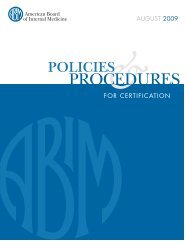The SRA Symposium - College of Medicine
The SRA Symposium - College of Medicine
The SRA Symposium - College of Medicine
You also want an ePaper? Increase the reach of your titles
YUMPU automatically turns print PDFs into web optimized ePapers that Google loves.
Obtaining knowledge about policy changes was ranked the third most important issue, though<br />
the resources needed to accomplish this are not available. <strong>The</strong> staffing necessary to keep up with<br />
new policies in human subject research does not seem to exist in predominantly undergraduate<br />
institutions in the South. Of the respondents, only 20% have full-time staff and 20% have parttime<br />
staff dedicated to working with the IRB. <strong>The</strong> remaining have full-time or part-time staff who<br />
devote a small portion <strong>of</strong> their work hours to the IRB. Only 27% <strong>of</strong> the institutions employ a fulltime<br />
Compliance Officer, who can dedicate larger amounts <strong>of</strong> time towards the IRB and keeping<br />
updated on new federal policies. <strong>The</strong>re is a great dissonance between what research administrators’<br />
needs and concerns are and the resources and staffing available to handle them. Because an<br />
incredible amount <strong>of</strong> work goes into human subject research, full-time staff is essential in ensuring<br />
that universities and administrators are aware <strong>of</strong> federal policy changes. However, the limited<br />
resources made available for compliance at Master’s I universities does not support this need.<br />
None <strong>of</strong> the surveyed institutions are provided a budget specifically used to support the IRB and<br />
their activities. Any money spent towards training, support staff, or compensation comes from the<br />
research <strong>of</strong>fice budget. <strong>The</strong>refore, very few Board members receive any kind <strong>of</strong> compensation for<br />
their time and effort put into the IRB. Only 13% <strong>of</strong> the respondents provide compensation to IRB<br />
members, <strong>of</strong> which only the chairperson or non-affiliated member receive.<br />
With the completed surveys that have been returned, slight connections are visible among different<br />
aspects <strong>of</strong> IRBs infrastructure. Some <strong>of</strong> our greatest challenges as research administrators must<br />
be dealt with at the institutional level, since we have no affect at the federal level. Realizing that<br />
many <strong>of</strong> these issues seem to exist among most Institutional Review Boards in the South provides<br />
a clear picture <strong>of</strong> changes that need to be made. Many <strong>of</strong> us are dealing with the same issues, such<br />
as a lack <strong>of</strong> budget, providing training, and limited resources, which overlap and affect one another.<br />
Upon receipt <strong>of</strong> more completed surveys, I may begin to notice more defined trends and draw<br />
conclusions about the infrastructure <strong>of</strong> IRBs at Master’s I universities in the South. After identifying<br />
common problems and finding trends among IRBs and their infrastructure, research administrators<br />
may begin to discover ways in which they can be fixed.<br />
References<br />
Bowen, A., Fleischman, A., Emanuel, E., Wood, A., et al. (2004). Oversight <strong>of</strong> human participants<br />
research: Identifying problems to evaluate reform proposals. Annals <strong>of</strong> Internal <strong>Medicine</strong>,<br />
141(4), 282-291.<br />
Bramstedt, K., & Kassimatis, K. (2004). A study <strong>of</strong> warning letters issued to institutional review<br />
boards by the United States Food and Drug Administration. Clinical and Investigative <strong>Medicine</strong>,<br />
27(6), 316-323.<br />
Protecting human beings: Institutional review boards and social science research.<br />
(2001, May/June). Academe, 87(3), 55-67.<br />
Papers<br />
2005 <strong>Symposium</strong> Proceedings Book 131

















